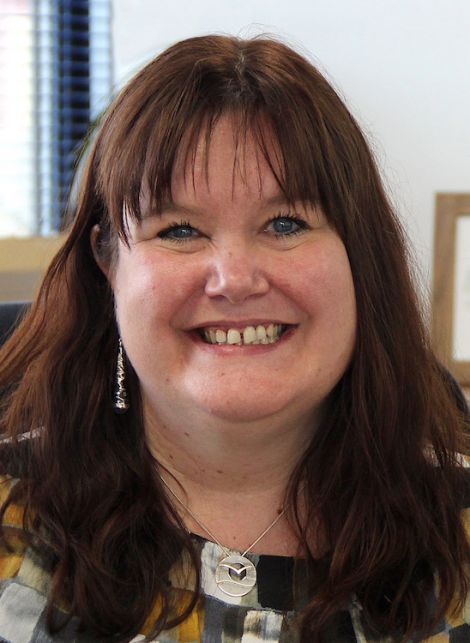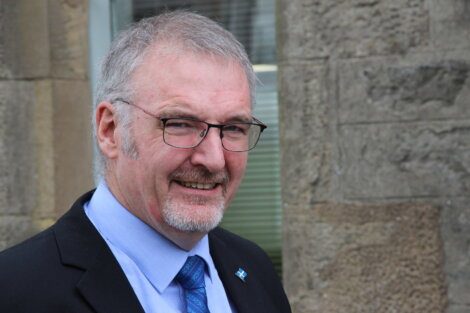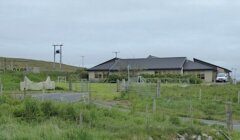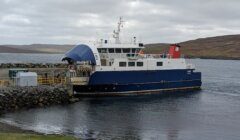Council / Action plan in place to respond to SIC best value concerns
SHETLAND Islands Council (SIC) has approved an action plan designed to respond to concerns raised by auditors in a best value report.
A “sounding board” for the plan will also be set up featuring councillors from each ward.
But warnings were made in the council chamber on Wednesday about keeping finances – a key concern in the best value report – under control.
Meanwhile Shetland Central member Ian Scott registered his objection to the report to councillors after taking issue with figures about the SIC’s reserves.
The Audit Scotland best value report, released earlier this year, was discussed at a meeting of the full council on Wednesday.
The report said the council had been slow to improve its plans for financial sustainability and has not yet demonstrated that it is meeting its ‘best value’ duty in a number of important areas.
It also highlighted that while the council’s elected members and senior management have good working relationships, “they are not yet providing the strategic leadership needed to co-ordinate and drive forward plans”.
Public watchdog Accounts Commission then delivered its own findings on the report, saying it had “serious concerns” about the SIC’s ability to demonstrate best value, and that urgent progress was needed.
A number of strengths were also highlighted, including the delivery of services, high customer satisfaction, the SIC’s response to the Covid-19 pandemic and the partnership working at play in Shetland.
But Accounts Commission chairman William Moyes said the report highlighted some “serious problems”. One issue in particular is the funding deficit which could grow over the coming years if not addressed.
A follow-up report is due within 18 months.
The full council meeting on Wednesday gave elected members a chance to formally respond to the best value assurance report.
Become a member of Shetland News
They heard from council chief executive Maggie Sandison that concerns raised in the report have already been worked on.
This includes, for example, plans for bringing in increased public engagement with the council’s budget setting process for 2023/24.
A report to councillors said delivering the action plan will need “careful planning, co-ordination and monitoring to make sure priorities are delivered quickly and effectively”.
Sandison said it is “critically important” that councillors are involved in the project, and a sounding board featuring a range of members will be set up.
Ahead of councillor seminars for the 2023/24 budget taking place next week, the SIC’s finances were raised in discussion.
The council still undertakes draws from its reserves that are deemed unsustainable to cover costs.
A report presented at Wednesday’s meeting said the projected unsustainable draw for 2022/23 currently stands at £8.1 million.
Scott, a long supporter for spending more from the reserves, questioned estimates on how long it would take for this money to run out.
At the end of October the SIC’s reserves were valued at around £380 million.
Modelling in the best value report estimated a funding shortfall of over £200 million over the next 35 years, “based on the level of capital expenditure required to maintain the existing asset base, whilst retaining acceptable levels of revenue expenditure”.
There is also a warning that reserves are projected to be fully depleted by 2030/31 if draws from the coffers continue at the current rate, as the impact would be compounded.
Scott said the report coming in front of councillors was like “Groundhog day”.
He questioned the figures around the reserves being depleted – but the meeting was told unplanned growth in budgets though spend such as pay awards and the cost of fuel and goods becomes cumulative.
Depute leader Gary Robinson, who first joined the council in 2007, said lessons can be learned from previous years.
Serious concern was expressed by the Accounts Commission about the SIC’s spending back in 2010.
He said there is a “slippery slope” when it comes to spending unsustainable amounts which is hard to recover from.
Robinson suggested there was a “fundamental question around who we want to be running this council” in the coming years – elected members or administrators called in to balance the books.
Another senior councillor with experience of the past is Shetland South’s Allison Duncan, and he said the financial forecast figures “speak for themselves”.
Meanwhile council leader Emma Macdonald said it was “vital that we take control of the unsustainable spending”, but she acknowledged the challenge.
But Scott said unlike NHS Shetland the council does not have to stick by a balanced budget, and claimed elected members were being “gulled” by the best value report.
Meanwhile Macdonald also said she appreciated the way elected members wanted to take ownership of the way forward.
She said the best value report highlighted good quality services, “but we know the sustainability of these services is becoming increasingly challenging”.
“Not just financially – some of that is down to the inability to recruit,” Macdonald said.
She added that the only way the council will be able to report back positively for the follow-up is if members work together.
During discussion Shetland South member Robbie McGregor also said he was “panic stricken” about cost pressures and said he “hoped this is not going to be too big a job”.
But Sandison said it was important that all members have “collective responsibility” to try to address the growth in budgets.
She said for example an option is to try to redesign services in an attempt to reduce the reliance on agency workers.
Local Green member Alex Armitage also reiterated it was important to continue to support those “at the sharp end of fuel poverty”, despite the funding challenges.
Meanwhile the sounding board for the action plan will consist of: Gary Robinson (Lerwick North and Bressay), Cecil Smith (Lerwick South), Catherine Hughson (Shetland Central), Allison Duncan (Shetland South), Robert Thomson (North Isles), Liz Peterson (Shetland West), Tom Morton (Shetland North).
A chair and vice-chair will be appointed in due course.
Later in the meeting two motions around free public transport and universal school meals fail to gain enough support to pass – with finances a key concern.
Become a member of Shetland News
Shetland News is asking its many readers to consider paying for membership to get additional features and services: -
- Remove non-local ads;
- Bookmark posts to read later;
- Exclusive curated weekly newsletter;
- Hide membership messages;
- Comments open for discussion.
If you appreciate what we do and feel strongly about impartial local journalism, then please become a member of Shetland News by either making a single payment, or setting up a monthly, quarterly or yearly subscription.

















































































